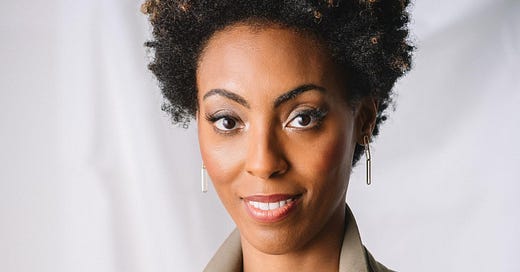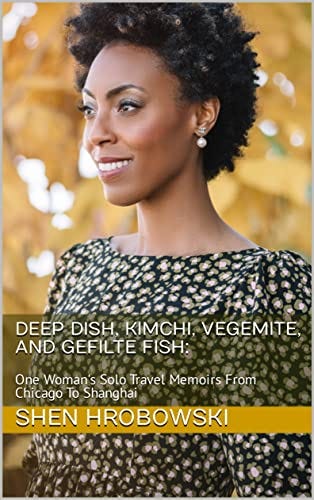In her early twenties, Shenita (Shen) Hrobowski had a dream of living overseas. Problem was, she just didn't know if and how it would manifest.
Shen had everything a bright-eyed twenty-something would want — a good college education, a promising career, and a vibrant social life. Instead of feeling happy and fulfilled, though, she found herself consumed by deep levels of anxiety. Her longing for diversity and her curiosity around familial relationships made her want more.
The first real “big girl” job she landed, she says, was as a senior analyst at a food and beverage market research firm. She recalls a encounter with a fellow work team member who shared something with her privately that got her attention:
“You are not like these other people. You belong somewhere else. Move abroad. I am telling you that you would love it and they would love you.”
I asked him, “Well, where should I go? He told me, “Go to Asia or Europe.
Reflecting back on the broader significance of her corporate work experience, Shen notes:
“My welcome invitation to the corporate world was nonexistent. While I had to find a way to exist, it was difficult not to feel completely invisible. Just because a company hires a person of color, doesn’t mean it has the infrastructure in place to support them and empower them to meaningfully contribute and add value to the business. I experienced microaggressions that were impossible to speak up about because they wouldn’t have been identified as explicitly racist.”
This was in the early 2000s when teaching English abroad was becoming popular. Following the thought-seed provided her co-worker, she decided to find a company that made it easy and accessible for her to sign up to teach. Her first step was to take a TEFL (Teaching English as a Foreign Language) course. Then she began teaching kids in the U.S. Over time, she became certified to teach abroad.
Recalling her journey, she adds:
“Over time I became certified to teach abroad. The first students I ever taught were older adult Koreans on the north side of Chicago. I remember my first day at the Korean senior community center. I was nervous, but I didn’t let anyone see. As soon as I walked into the building, I smelled garlic, but I didn’t mind as I absolutely love the smell of garlic.”
Circling back to that early dream, Shen found that these early forays in teaching English gave her a much needed push out of the rigor mortis of her comfort zone, prompting her to seek out global travel possibilities. This, she thought, would allow her to explore a fresh set of new cultures and experiences. So with celerity of intent, she embarked on a travel journey in search of herself, her faith, and for the perfect family she had always longed for.
The inner sanctum of Shen’s thoughts and experiences from her travel rendezvous across the globe are exquisitely captured in a delicious book called “Deep Dish, Kimchi, Vegemite, and Gefilite Fish: One Woman’s Solo Travel Memoirs From Chicago To Shanghai.” It’s her true story of how through the dizzying pace of her nomadic excursions that led to friendships in South Korea, familial relationships in China, and self-discovery in Australia, she discovers that there’s is no such thing as the perfect family or relationships.
Shen believes that the cascade of life altering experiences she encountered allowed her to better understand and heal from family issues from her early formative years. In a one-on-one interview discussion at a bustling coffeehouse in Denver’s toney Cherry Creek North District, she shared with deep vulnerability the unpleasant nature of some of these early experiences.
“Every Friday and Saturday night, the fighting inside my childhood home overwhelmed me. Whenever my parents argued, the walls shook. Any time I heard a loud thud, followed by my mother sobbing or shrieking, my heart sank to my feet. I shuddered as I tried to shake off the image of what that sound could’ve been.”
She admitted that nothing frightened she and her sister more than the sound of the weekly fighting. She attributes this in part to the immense pressures her dad may have felt during these years as a Black man in America.
“My dad was born in the late 1950s. He worked his way to the top at a manufacturing plant out of state. Every day he drove across state borders to get to work, where he faced constant discrimination.”
Shen says that she’s spent a great deal of time reflecting on and healing from the trauma experienced by both of her parents. In particularly, the verbal and racist abuse her father received from work colleagues in the form of insults and derogatory language is what she believes led him to react and respond in such an unhealthy way.
“He internalized the abuse and was unable to keep it in, and it spilled over to the only place he could let it out which was at home. Then there was the trauma of my mother losing her birth mother at such a young age which led to her having to move to a new city where she wasn’t fully accepted into the home by her stepmother.”
Despite all of this, Shen say she now realizes and appreciates the ultimate sacrifices both of her parents made in providing a middle class upbringing, adding:
“They did their best the only way they knew how while navigating their own trauma. I am extremely thankful for that.”
Shen credits Bob Ross, a popular painter, art instructor, and show host of his own television show “The Joy of Painting” as a peaceful respite from the anxiety she encountered in her life. Her mention of this immediately conjured up visual images for me of Bob’s afro toting, “Malcolm Gladwell” hairstyle, reminiscent of a 60s Black Panther Party member (Ross is white). She notes:
“One thing that saved me was Bob Ross. My sister and I were huge fans of him. Whenever we would get home from school, we would turn on The Joy of Painting to listen to Ross’s calm, voice while he crafting a new portrait.”
Having been raised in a predominantly Black Chicago neighborhood, Shen admits to not having much exposure to diverse experiences during those early years. That changed, she says, when she began attending college. A formative moment in her life is when she met an outgoing professor named Sean O’Sullivan who piqued her interest in China.
Shen’s first leap into teaching though was in Korea, with China coming a few years later. This, she admits, was daunting move given her trepidations on whether she would be accepted there
“When it was time to choose which country to teach in, I knew I wanted to be in Asia. And yet, here I was, a Black woman heading to South Korea.”
After living in Korea for a year, she went to work as an English teacher at a private foreign language school for adults in Beijing.
“I’m in China to experience authentic cultural exchanges. It was amazing how locals could point out our differences and appreciate them all at once.”
She continues:
“When Professor O’Sullivan told me that it would be tough to walk the streets of China as a Black woman, he wasn’t joking. Locals would gawk at me and then loudly talk about me in Mandarin.”
In an odd twist of fate, particularly for a Black woman, her time in China served as kindling for her early interest and ultimate conversion to Judaism.
“Judaism intrigued me because I’ve always wanted to find a path that could help center me and provide structure. Throughout my travels, I met a lot of Israelis who embraced a relaxed and cosmopolitan attitude toward their religion. I quickly learned that there are many countries that have some sort of chabad presence, a place where Jews, regardless of their level of observance - could go to pray, meet with a rabbi, observe cultural and educational activities, and connect with other Jews. No matter where I went, I could always find a community.”
After a year in Beijing, She determined that it was time to leave.
“As much as I loved the city, I felt emotionally, mentally, and physically drained.”
Continuing her nomadic ways, she decided that Australia would be her next spot to journey to:
“Two weeks after I arrived, I hit the ground running. I started working in event management at a wine bar, which was located in Southgate with phenomenal views of Melbourne’s Central Business District and the Yarra River. I worked in a fast-paced environment that was incredibly rewarding; Not only did I befriend my colleagues, I also met new people every day and ate exquisite meals.”
Upon completing her time there, she decided it was best to return to her hometown of Chicago adding…
…. “my travels were meaningful and eye-opening yet exhausting. At that point the only thing that made me feel better was some Chicago deep dish pizza,” she says with a chuckle
Asked about what sparked her decision to capture the story of her travails, Shen concludes with this thought:
“I wanted to write down my thought for my kids. I did so many things in order to get to where I am today. And I didn’t want to forget these things. My children are going to want to know where they're from. Like, “why did mom make such a decision? Why did mom go to China? What was she thinking? So I thought it would be important to sort of just capture that for them and my grandkids and just let them know the deeper story behind who I am.”
“Great Books, Great Minds” is my full-time work and life passion, a labor of love fueled by the endless hours of work I put into researching and writing these feature pieces. So if you enjoy this digital newsletter, find it valuable, and savor world-class book experiences featuring epic authors and book evangelists, then please consider becoming a paid supporting member at $6.00 a month or $60.00/year.






